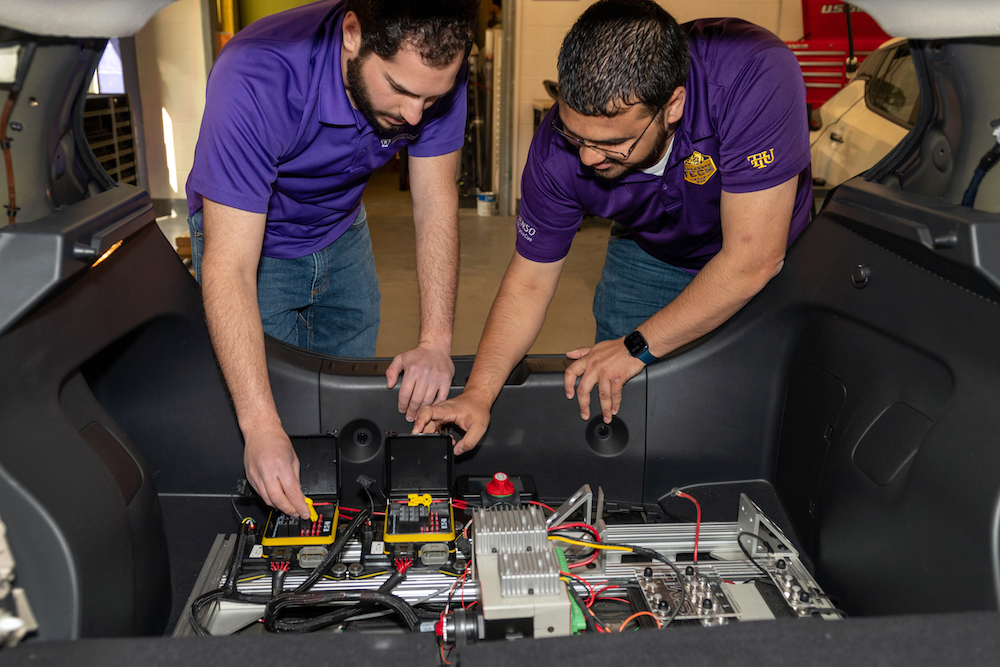Tech awarded funding to research electric vehicle battery recycling
 Tennessee Tech University was one of the 10 applicants awarded a part of the U.S.
Department of Energy’s recently released $73.9 million in funding for research to
advance technologies and processes for recycling and reusing batteries from electric
vehicles.
Tennessee Tech University was one of the 10 applicants awarded a part of the U.S.
Department of Energy’s recently released $73.9 million in funding for research to
advance technologies and processes for recycling and reusing batteries from electric
vehicles.
Tech received $4,531,642 of this funding for a project dedicated to bringing more electric vehicles and charging stations to rural areas.
“Electric vehicle batteries are designed to last the typical lifetime of the vehicle,” said Pingen Chen, Ph.D., associate professor of mechanical engineering at Tech, who is the principal investigator on the project. “For the battery, this equates to roughly 1,000 full depth of discharge cycles at a C/3 rate and a 15-year calendar life.”
When a battery for an electric vehicle degrades enough that it is no longer strong enough to meet the high-performance requirements of the vehicle, it still has enough power for other, less strenuous, uses. Tech’s project – titled Second-life Battery in Mobile EV Charging Application for Rural Transportation (SMART) – is to give new uses to these batteries instead of watching them end up in a landfill.
A goal of the Automotive Powertrain and Emissions Control Laboratory at Tech has been to make electric vehicles more accessible to people living in rural areas. One of the biggest obstacles to this is ensuring these vehicle owners have places to charge these electric vehicles. The solution has been mobile charging stations.
“This project aims to address the urgent need to develop affordable mobile charging stations that can be deployed in rural America at a large scale by utilizing second-life batteries retired from electric vehicles, which cost 70-75 percent less than new battery energy storage systems of the same size,” Chen said.
Undergraduate and graduate students will be assisting with the project. In addition to getting the chance to have a hand in providing solutions to real-world problems, they will also be gaining critical knowledge of lithium-ion batteries, including aging characteristics, battery state of health estimation, battery management system design and validation, mobile charging station design and deployment, and charging station network design and development.
“The students will have the opportunities to work with industry partners such as Nissan North America, Envision AESC – the leading battery manufacturers in the U.S. – and mobile charging station manufacturers, battery testing and recycling companies,” Chen said.
Along with Chen, a number of other Tech faculty members are involved in the project, such as co-principal investigators: Nan Chen, Ph.D., assistant professor of electrical and computer engineering; and Joseph Ojo, Ph.D., professor of electrical and computer engineering.
They are also joined by senior personnel: Jie Cui, Ph.D., and Jiahong “John” Zhu, Ph.D., both professors of mechanical engineering; Steven Anton, Ph.D., associate professor of mechanical engineering; Ali Arzani, Ph.D., research assistant professor of the Center for Energy Systems Research; Ahmad Vasel, Ph.D., assistant professor of mechanical engineering; Syed Ali Asad Rizvi, Ph.D., assistant professor of electrical and computer engineering; and Terry Guo, Ph.D., research assistant professor at the Center for Manufacturing Research.
This funding from the U.S. Department of Energy is one of many that Chen has been able to help secure over the years. His research as either a principal or co-principal investigator while at Tech has received more than $20 million in funding from not only the U.S. Department of Energy, but also the Tennessee Department of Transportation, Tennessee Department of Environment and Conservation, Tennessee Tech University itself, Denso, Nissan and others.
“My research team has also established strong partnership with more than 70 electric vehicle stakeholders in the nation to help underserved communities accelerate the transportation electrification in the U.S.,” Chen added.

